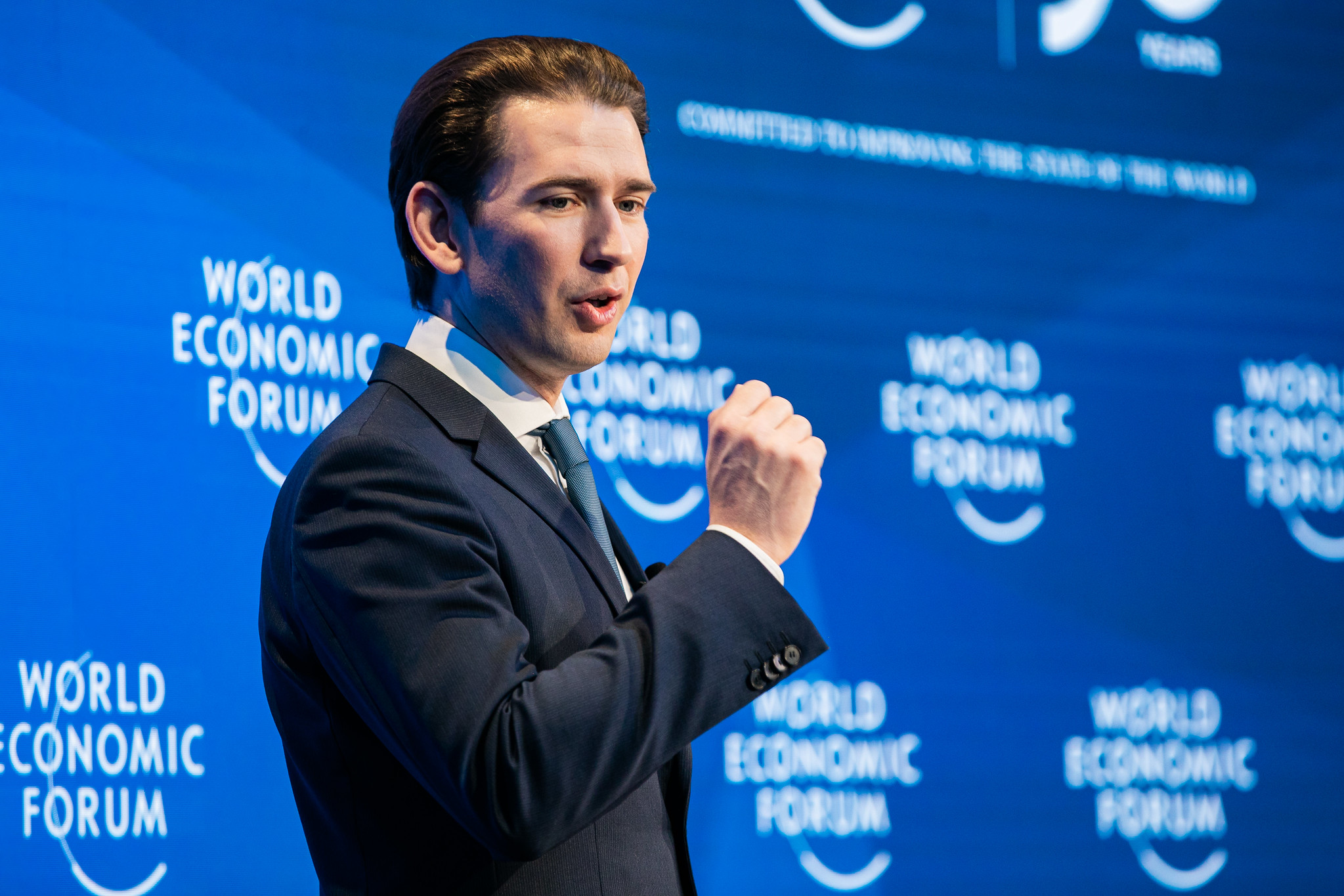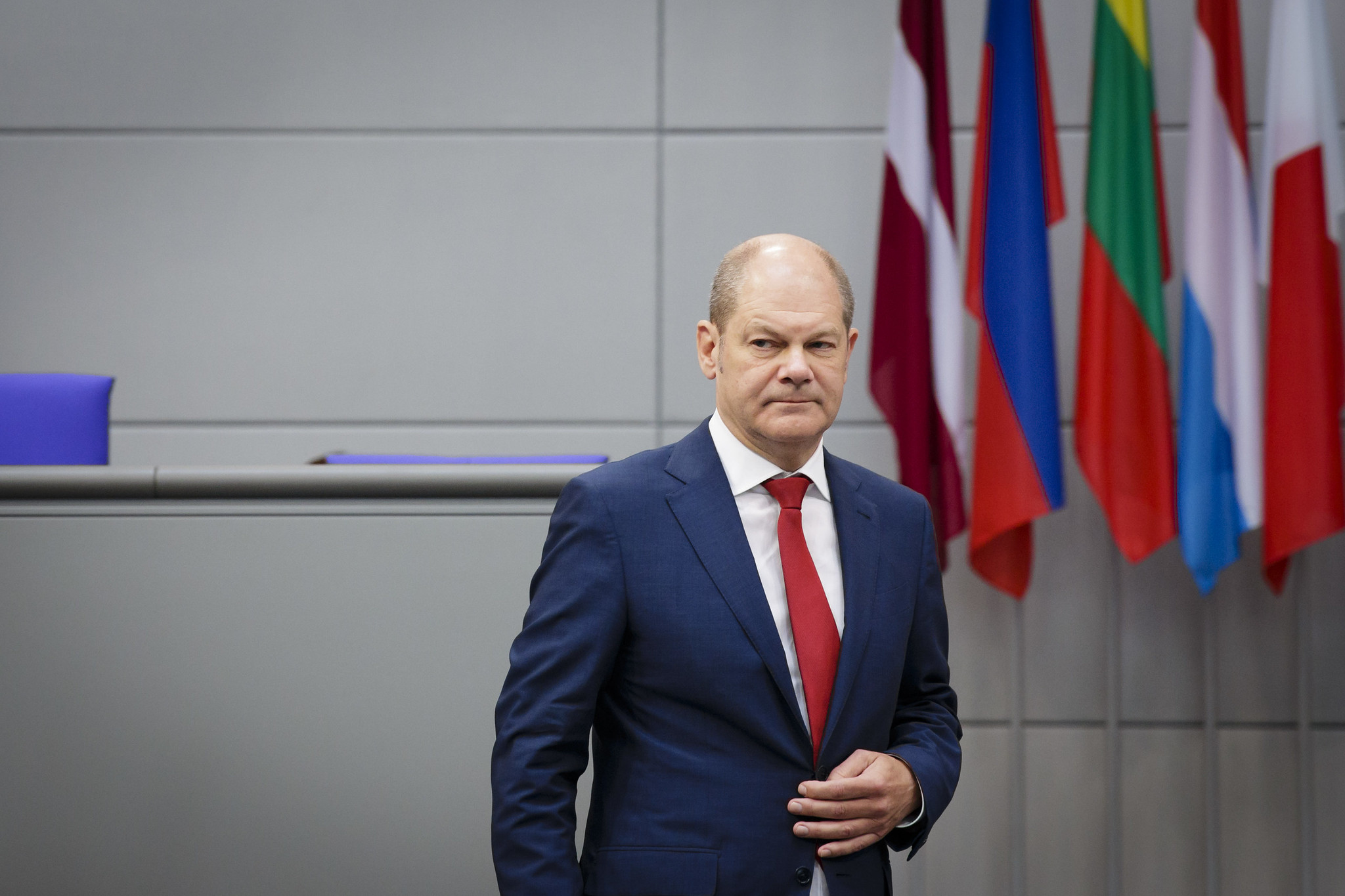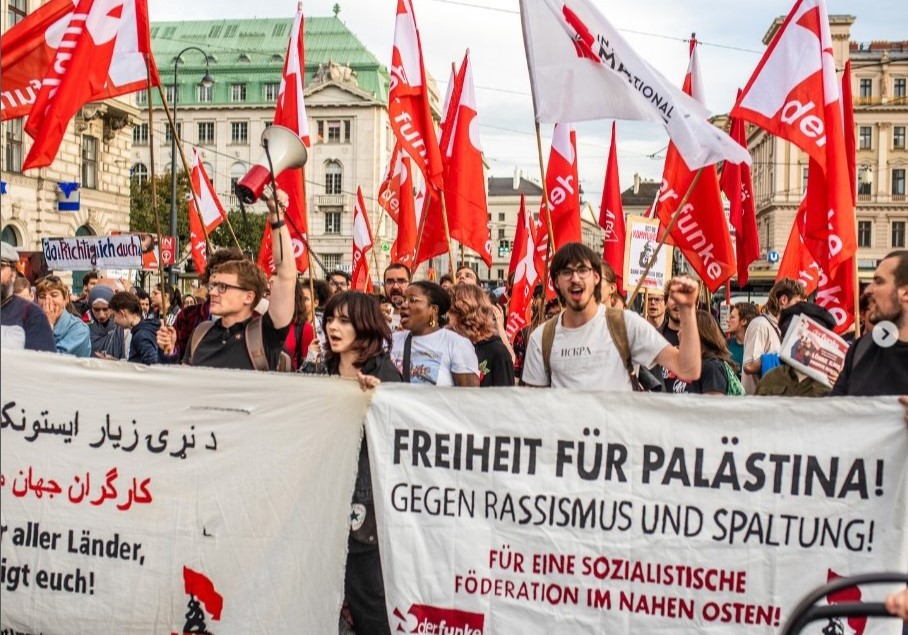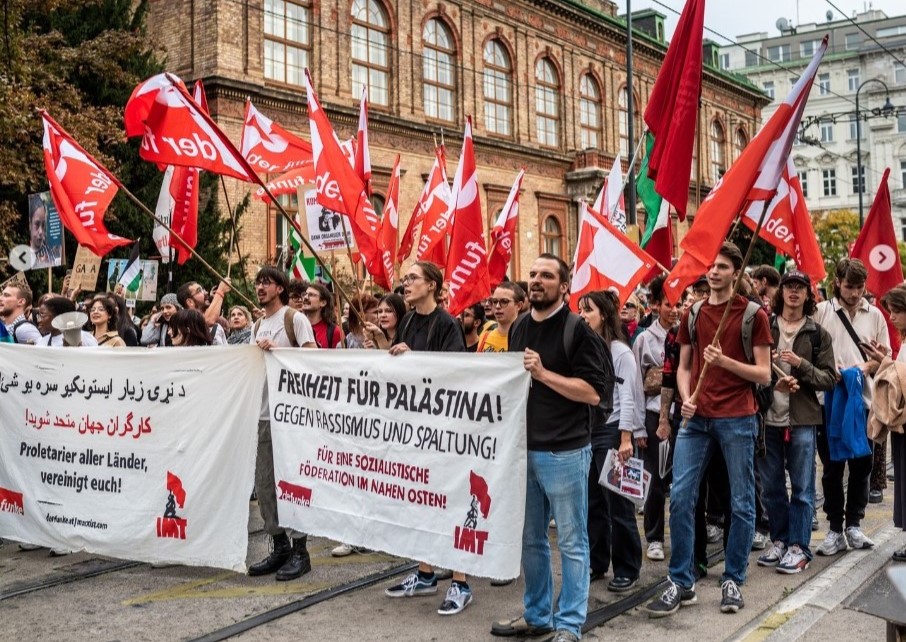Bourgeois democracy in Austria is in a senile crisis. Like in other countries in Europe, the Hamas attacks of 7 October have been used to whip up a reactionary mood. Muslim migrants and the communists of Der Funke (the IMT in Austria) are at the centre of these political attacks, with reformist leaders of Social Democracy and Communist Party actively persecuting party members who stand in solidarity with the Palestinians.
“Across party lines and political views, we are united in our solidarity with the Israeli people and the State of Israel.” With this declaration for national unity on the part of all the parliamentary parties, the ruling class has sought to recover political stability in a situation where everything points in the opposite direction: towards economic and political chaos, class struggle and growing polarisation.
The crisis of the democratic regime is so deep that it has become necessary for the bourgeoisie to split the working class along the lines of a culture war. This method is used against any opposition to exploitation and oppression. The bosses of the metal industry, for instance, claimed that their lives were threatened by the aggressive views and language of workers against them. They accused the trade unions of being complicit, and demanded that union officials “distance themselves from violent speech” in order to proceed in the collective bargaining process.
The new tone from the bosses is no surprise. Class-collaborationist politics has a diminishing base. The bosses in the metal industry have offered a mere 5 percent wage increase when the yearly inflation is twice as high. Workers in 400 factories entered the strike movement, significantly more than on the last occasion five years ago, when 180 went on strike. Participation in the strike is reported to be high, despite several instances of union breaking efforts. Only a sell out by the union leadership can prevent an indefinite strike movement of the metal sector, while other sectors like private social services and the commerce sector are preparing for strikes.
Meanwhile, unprecedented orchestrated waves of racism and attacks on democratic rights are now common features in the situation. Like in many other European countries, the political centre has taken up far-right political rhetoric like “mass deportations”, and preparations to enact laws limiting free speech and assembly. The ‘left’ and the reformists are capitulating to the pressure and are not putting up any opposition.
Austria on a downwards spiral
Economic analysts believe Austria is on its way towards a crisis much like that which struck southern European nations in the 2010s. There are reasons to believe they may be correct. The economy is expected to shrink 0.8 percent this year, which would make Austria the worst performing economy in the EU, followed by Germany whose economy is also in a recession. Inflation is also at the highest level in the eurozone for the second year running. This comes amidst historic highs for the profits of the corporations. These problems are not merely cyclical.
Unconstitutional handouts to the bosses during the pandemic, which amassed more than €20 billion, are being followed by new hand-outs to reduce the energy price crisis for industry. A series of additional state programmes have been enacted to inflate profits in all sectors of industry and for key sectors of the petty bourgeoisie like agriculture.![]() The Ukraine war threatens 20 percent of the total energy consumption of Austria / Image: rawpixel.com
The Ukraine war threatens 20 percent of the total energy consumption of Austria / Image: rawpixel.com
The Ukraine war threatens 20 percent of the total energy consumption of the country, which is delivered through the one remaining natural gas pipeline from Russia via Ukraine to Vienna. The soaring profits of the country’s leading bank, the RBI, are also threatened by the sanctions regime of the West and Russia alike. The fact that Russia is the second largest investor in Austria has also left the country economically exposed since war broke out last February. Billions in war profits are presently stuck in Russia, depriving RBI’s central headquarters of much-needed liquidity, and awakening the keen interest of the US State Department sanctions authorities.
Rising interest rates have collapsed the credit-driven real estate boom, curtailed the building industry, and have fueled the slow-motion meltdown of the giant Signa-Holding asset corporation of Austria’s fourth-richest billionaire, Rene Benko. Benko had already been found guilty of corruption in 2014, but he was nevertheless able to make it as a tycoon by expanding his business interests further with the help of high-ranking political friends in all political parties and media corporations (and he bought the most important of those media outlets). Now his empire is melting down, a meltdown comparable to that of Evergrande in China. More than 60 banks are believed to be exposed to this collapse, firstmost among them being the already mentioned RBI, which is believed to have outstanding credits to Sigma worth €1 billion.
Meanwhile, for the first time in more than 30 years, rising interest rates are expected to increase the share of GDP required to repay the public debt.
Technological changes, like the substitution of combustion engines for electric-driven systems, are eating into the profitability of the important automotive sector, which also faces stiff competition from Chinese manufacturers that have achieved global leadership in these new technologies.
Just like elsewhere in Europe, whole sectors of public services (hospitals, teachers, kindergarten) are on the brink of collapse because of labour shortages compounded by an ageing workforce. Poor labour conditions, long hours and big work pressure make it impossible to sustain the old level of public services, as newly qualified workers simply escape the public sector as soon as possible. There is no solution in sight and labour unrest in these sectors is constantly palpable.
Political instability
The biggest concern of the ruling class, however, is that there is no political constellation with a parliamentary majority in sight for the needed strategic decisions and social attacks. In the last six years there have been five different prime ministers. Time is ticking. A general election needs to be held within 12 months, but there is no easy solution to build a stable and cohesive government.
Polls have shown a solid lead for the nationalist FPÖ for a year now. Its support is above 30 percent. The FPÖ is now in three regional governments, but its national leader, Herbert Kickel, has an anti-establishment image and is uncontrollable. The bourgeoisie does not, therefore, favour the party forming a new government. This is exactly what makes the FPÖ so popular amongst voters. Social democrats and the ruling conservative party compete for second place but both are far behind, polling between 19 and 24 percent. Then greens and liberals each poll less than 10 percent. A two-party coalition is therefore an unlikely option.
But more problems are in the pipeline. A new formation, the BIER (beer-party), has capitalised on disillusionment with the existing parties and has gained popularity among urban youth in particular. They already poll third in Vienna, even ahead of the conservative party, and would definitely enter the national parliament if it decides to run in the election. And another newcomer is likely to make it into parliament: the Communist Party should be coming back into national politics for the first time since 1959.
 Ex-chancellor, Sebastian Kurz, is in the courts charged with corruption at the moment / Image: World Economic Forum, Flickr
Ex-chancellor, Sebastian Kurz, is in the courts charged with corruption at the moment / Image: World Economic Forum, Flickr
To make things even more complicated, the traditional parties are riddled with internal crises. The ruling conservative ÖVP is a true ‘people’s party’, which is embedded in big business and the state, but with roots extending down to every village. It has been in power for almost 40 years, is riddled with corruption, and meets with public disgust. Its ex-chancellor, Sebastian Kurz, is in the courts charged with corruption at the moment. If found guilty, this could open a number of additional court proceedings. This possibility only opened up after long-standing top state prosecutor Pilnacek of the ÖVP was brought down due to splits in the juridical apparatus. Pilnacek was found dead on the second day of Kurz’s court case, and an investigation is now underway. A traditional Christian Democrat leader Othmar Karas, Vice-President of the European Parliament has now split from the party and is looking for a new political affiliation.
Until earlier this year, the capitalists felt comfort in the fact that the leading opposition party, the SPÖ, was led by a liberal. The (non-)opposition of social democracy was designed precisely to take on a share of government at any time they are called in. From the point of view of the bourgeoisie, reintegrating the SPÖ into government has the advantage that its much needed counter-reforms are more feasible when carried out by the Social Democrats.
Desperation to participate in government is the common denominator for all fractions of the SPÖ. The unions want to be back in the ministries to soften class conflict by reestablishing class collaboration on the highest political level. Meanwhile, the petty-bourgeois party apparatus is desperate to open the road to careers in the state, which has been blocked to them. Even the youth organisations are desperate to get access to public finances. Deprived of participation in state affairs for six years, the once highly centralised Social Democratic party has been falling apart along the lines of regional interests and regional strongmen.
A split in the party leadership meant that the central bureaucracy lost control of the situation earlier this year, and this opened the way for left-winger Andreas Babler to conquer the party leadership in June. However, by renouncing his hitherto anti-imperialist and self-described Marxist views he quickly capitulated, and made himself the hostage of the apparatus and of liberal trends. It is like the experience of Corbyn in miniature, only more laughable, and probably more short-lived.
Israel: a matter of “national interest”
If, in the conflict between Russia and western imperialism, the Austrian capitalist class was caught falling between two stools, in the case of Israel the situation is completely different. “Unconditional support for Israel,” we are told, is a question of “national interest”.
And, indeed, this is a question of deep interest for the capitalist class. Its historic roots can be traced back to the ideological setup of the “reconstruction period” after the Second World War. The capitalist class that had brought Hitler to power was never held accountable.
The Holocaust was the single worst atrocity in the 20th century, in which more than six millions Jews were killed in cold blood in a meticulously organised industrial hyper-exploitation and extermination campaign. But the class responsible for this mass murder has never been called to justice. In fact, lists of the richest capitalists in Austria and Germany today are full of the family names of those who made their fortune on the back of forced labour during Nazi rule. A full break with fascism would only have been possible on the basis of the complete expropriation of the capitalist class. In short: a socialist revolution.
This is not how history went, however. Western Germany and Austria were rebuilt on a capitalist basis, though amidst an anti-fascist mass consciousness. The crime of the Nazis were ideologically packed into a “collective guilt” of all Germans, ignoring the class character of fascism, the role of anti-semitism as the banner of bourgeois reaction, and the arduous fight of communists and workers’ organisations in the resistance against the Nazis, which the ruling class and the reformists preferred the masses to forget.
In Austria, the ideological set up of post-fascist nation-building was even more absurd. Here, the ruling class, in accordance with the Allies, wrote a founding document of the Second Republic claiming that Austria was collectively the first victim of Nazi-fascism. So nobody was responsible for Nazi crimes! This meant throwing a cloak of amnesia, not only over the Austrian ruling class’ involvement in the crimes of Nazism and the profit it made through those crimes, but also over the crimes of Austro-fascist rule which arose on the basis of the civil war in 1934. Only in the late 1980s did the ruling class switch its mode of historical fabrication from that of “collective victimhood” to that of “collective guilt”.
In the ideological setup of modern Austria and Germany, the state of Israel is understood as the harbour for the Jews who were not killed by our grandfathers’ generation, and therefore unconditional support for this state flows directly from our common responsibility for the Holocaust. These are precisely the terms used by the German foreign minister Habeck after Hamas’ 7 October attack.
 The German and Austrian ruling class are disguising their renewed imperialist ambitions behind the mask of… opposition to antisemitism / Image: OSCE Parliamentary Assembly, Flickr
The German and Austrian ruling class are disguising their renewed imperialist ambitions behind the mask of… opposition to antisemitism / Image: OSCE Parliamentary Assembly, Flickr
These days, national collective guilt is even transformed into a global collective guilt. As German Chancellor Scholz put it when answering questions regarding the international isolation of western imperialism in the case of both Ukraine and Palestine: “The Holocaust was a crime against humanity, and humanity includes all the inhabitants of our planet.” The message is clear: we have learnt from history, although unfortunately not everyone has, and so we have a moral duty to enforce this truth – starting at home. The slogan for this campaign is: “Never again – this is now!”
Thus, the German and Austrian ruling class are disguising their renewed imperialist ambitions behind the mask of… opposition to antisemitism and sympathy for the victims of the Holocaust! Among workers and the youth, such nonsense has a limited impact, but the petty bourgeoisie always has a weak spot for such hypocrisy, especially on the left. The level of confusion can be seen in three disgraceful incidents. In Vienna, so called ‘anti-fascists’ organised a demo in opposition to the pro-Palestinian demo; the radical wing of the climate movement stopped their activities “in order not to bind police forces, who will be needed to protect lives”; and in Berlin another so-called ‘anti-fascist’ group vandalised a Muslim café. Such disgraceful conduct is usually reserved for ultra-reactionaries, but in Germany and Austria has been taken up by groups claiming to be on the left.
Muslims and Marxists in the crossfire
As already stated, the political centre is dead and the ruling class is afraid to lose its grip on society, particularly on the youth. This is what Der Standard, a liberal (!) daily, wrote earlier this week:
“We have a problem with our Muslim fellow-citizens. With those who find it difficult to integrate into our society, who live in a parallel world. And now they are increasingly living out their anti-Semitism, their hatred of Jews and, ultimately, their rejection of our social order. That’s by no means all of them. But let’s be honest: there are many. More than we want to handle. This problem is particularly visible in schools. Muslim boys openly live out their aggression, their enemy images and their values that are contrary to our own.”
The fact that the liberals are engaging in such blatant racism shows their extreme weakness. Capitalism has nothing to offer, and therefore neither have its defenders.
They have fast tracked a new hate-crime law aimed at dealing with “anti-semitic hate crimes of the left, right and migrants”. 200 officers of the political police are being sent into schools for “deradicalisation programmes”. Regional governments are pushing to force migrants to sign “integration contracts”. At the same time, they are raising the prospect of “large-scale deportations”. German chancellor Scholz took up this ultra right-wing slogan last week, and SPÖ leader Andi Babler also gave a cowardly defence of the same stance in his interview on Sunday, saying that it was “logical” to support this reactionary political stance, and not a “political question”. If we believed in the analysis of ‘moderate’ politicians, the conclusion would be that the Austrian Caliphate under the rule of Sharia and the Prophet’s sword is just around the corner.
This hysterical campaign immediately set in with the declaration of ‘national unity’. Like elsewhere, the bourgeois press insisted that ‘hate crimes’ were exploding, mainly directed against Jewish citizens and Israeli symbols. The government declared an “immediate danger of terrorist attacks”, for which there was no evidence. Police authorities were forced to politically justify themselves for not banning all pro-Palestine gatherings. Pro-Palestine demonstrations and gatherings are still severely restricted. More than 10 have been banned so far. The police claim that the slogan, “From the river to sea – Palestine will be free” constitutes a ‘hate crime’, and on several occasions similar arguments have been used to insist that even the slogan “Free Palestine” is a hate crime. This political strategy has a logic of keeping protests isolated and divided.
In short, the ruling class unleashed a campaign of ratcheting up tensions. Petty-bourgeois hysterics, liberals, as well as self-declared ‘anti-fascists’ all join the show of “national unity against antisemitism” in the papers and on screen. Much like elsewhere in Europe, pro-Palestine demonstrations in Austria have been declared to be “anti-semitic gatherings that celebrate the killing of Jews”, and declared a security problem for Jewish citizens. The real situation in either Austria, or in Gaza and the West Bank, barely makes it onto the news today. Top journalists of the national broadcasting corporation ORF, who attempted to maintain a professional attitude in reporting, were silenced after the Hamas attacks.
Practically all left-wing formations capitulated to this reactionary campaign, remaining silent, and staying away from the pro-Palestinian demos, etc. Aside from Der Funke (IMT Austria), only the communist youth immediately took the side of the Palestinians – but their party is now also clamping down on them. They do not wish to see their election chances diminishing by standing up to the bourgeois press.
Therefore, the presence of Der Funke at demos and the circulation of the International Marxist Tendency’s declaration, “Down with hypocrisy! Defend Gaza!” made for an outstanding feature in Austrian politics.
Beginning on 16 October, a coordinated campaign began in the media to slander our political stance in solidarity with the Palestinians. ORF reported on 18 October that the IMT statement “celebrated the Hamas attacks as a revolutionary deed”, which is, of course, a lie. Social Democratic party officials, starting with the national headquarters and repeated by regional party leaders, spoke of “anti-semitic propaganda and sympathy for barbarism that had no space in the party”, giving credibility to the bourgeois lies. Of course, the barbarism that has been on display in Israel’s treatment of the Palestinians and the war on Gaza is of no political concern to these party officials.
 The communists of Der Funke have been pushed into the arena of national politics / Image: Der Funke
The communists of Der Funke have been pushed into the arena of national politics / Image: Der Funke
This cowardly strategy backfired, as the conservative party headquarter started to use these slanders to keep the ‘left’ national leadership of the SPÖ under constant pressure, in order to deepen the crisis in the party right before the national congress. Right-wing and liberal forces have also used this campaign to strengthen their racist anti-immigration and pro-war, pro-NATO policies standing inside the party.
The ‘theoretical’ basis for the expulsions of the Marxists is being laid on the basis that we… defend a class analysis of society! An SPÖ statement that argues for our expulsion laid this out:
“The class antagonism of [Der Funke] is as flat as the division of the right-wing populists between the people and the elite. The presumption to speak for the ‘people’ (the ‘class’) is just as hair-raising as that of the right-wingers, only more removed from reality.”
In the eyes of these social-democratic liberals, the division of society in classes and the existence of exploiters and exploited is something that “reminds us of the KPD in the 1920s”.
Regardless of the motivations of the capitalist class and its representatives inside the labour movement, the communists of Der Funke have been pushed into the arena of national politics. We are in the focus of hundreds of media reports and investigations and have made it into parliamentary debates. Our organisation now is known by a wide layer of society. This has opened up big opportunities for us.
We have now organised two very successful pro-Palestine demos in Vorarlberg and Graz (with 1,000 mainly migrant participants), as well as helping out with the Viennese demos, and intervening successfully in Tirol and Linz.
More than that, we stepped up our ‘Are You a Communist?’ campaign, tabling in popular areas and schools. We have received a large number of messages of support (about 100, and we are happy to receive more). We have had an explosion of social media followers and participants in our meetings, as well as new groups of supporters in new towns and areas. We have also stepped up paper sales on the streets to give people a chance to talk directly to us.
The results of this energetic campaign tell us that the real mood in the working class and the youth is very far removed from the media lies and distortions. As a matter of fact, media corporations are getting very worried about their sinking credibility in society, especially among the youth.
The ruling class in Austria understands what we understand. The present situation will not last. The strike movement of the metal workers reveals that we have entered a new era of class struggle. The political crisis is too deep to be patched up by parliamentary manoeuvres. The coming government will be another one of permanent crisis. It will be in need of much more numerous and more severe attacks, but it will stand on more fragile foundations.
The senile decay of capitalism is eating into the fabric of what was once one of the most stable imperialist countries in the world. The deep crisis is undermining the social basis of reformism in the working class. The strong reformist traditions and organisations are increasingly anaemic, unable to connect organically with the new generation of workers: they are a house of cards dependent on money and posts from the state. Historic changes of this magnitude take some time, but the future belongs to the communists.
